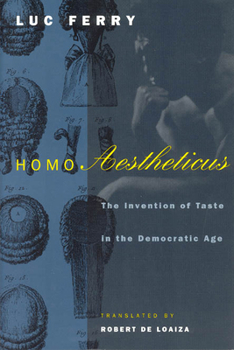Homo Aestheticus: The Invention of Taste in the Democratic Age
Can subjective, individual taste be reconciled with an objective, universal standard? In Homo Aestheticus, Luc Ferry argues that this central problem of aesthetic theory is fundamentally related to the political problem of democratic individualism. Ferry's treatise begins in the mid-1600s with the simultaneous invention of the notions of taste (the essence of art as subjective pleasure) and modern democracy (the idea of the State as a consensus among individuals). He explores the differences between subjectivity and individuality by examining aesthetic theory as developed first by Kant's predecessors and then by Kant, Hegel, Nietzsche, and proponents of the avant-garde. Ferry discerns two "moments" of the avant-garde aesthetic: the hyperindividualistic iconoclasm of creating something entirely new, and the hyperrealistic striving to achieve an extraordinary truth. The tension between these two, Ferry argues, preserves an essential element of the Enlightenment concern for reconciling the subjective and the objective--a problem that is at once aesthetic, ethical, and political. Rejecting postmodern proposals for either a radical break with or return to tradition, Ferry embraces a postmodernism that recasts Enlightenment notions of value as a new intersubjectivity. His original analysis of the growth and decline of the twentieth-century avant-garde movement sheds new light on the connections between aesthetics, ethics, and political theory.
Format:Hardcover
Language:English
ISBN:0226244598
ISBN13:9780226244594
Release Date:January 1994
Publisher:University of Chicago Press
Length:280 Pages
Weight:1.30 lbs.
Dimensions:0.9" x 6.3" x 9.3"
Customer Reviews
1 rating
Homo Aestheticus: art and culture in a democratic world.
Published by Thriftbooks.com User , 25 years ago
Luc Ferry is a contemporary French philosopher who breaks from the "norm". While the establishment flatters itself in an anti-American free for all, he conducts a serious reflection upon the potentialities of a truly democratic culture. What is a work of art? Only recently has this question been raised with real interest and intensity. In ancient times, the answer appeared self-evident, one simply referred to the absolute authority in such matters: tradition. A work of art was intended to reflect the traditional world order. It derived from this expectation its sacredness as well as its stability. Egyptian illustration, for instance, stayed essentially unchanged and unquestioned for thousands of years: what was beautiful was what was sacred, and what was sacred was what followed "The Canon". Today, many of us refuse all given traditions, all given world orders, all given canons. Rather than having inherited a given cosmos, we have inherited a democratic spirit that questions the authority of tradition. We no longer expect works of art to be the sacred reflections of an ordered universe, but the secular reflections of an individual, be he or she a "genius". But does this imply artistic judgement are just a matter of "feelings" («to each their own taste"). Is the quality of a work of art entirely relative? Can there be a democratic cosmos (starting from man rather than from a given model), and works of art that reflect it? What are the foundations of a truly democratic culture? In Homo Aestheticus Luc Ferry addresses these problems, and traces with remarkable clarity a number of important moments in the history of Aesthetics: from the classicists, to the romantics, to Kant; from Hegel to Nietzsche to Heidegaar. An important book for anyone who is concerned with the present evolution towards a "McCulture". An important book for anyone wearied by the monotonous newness of contemporary art.





